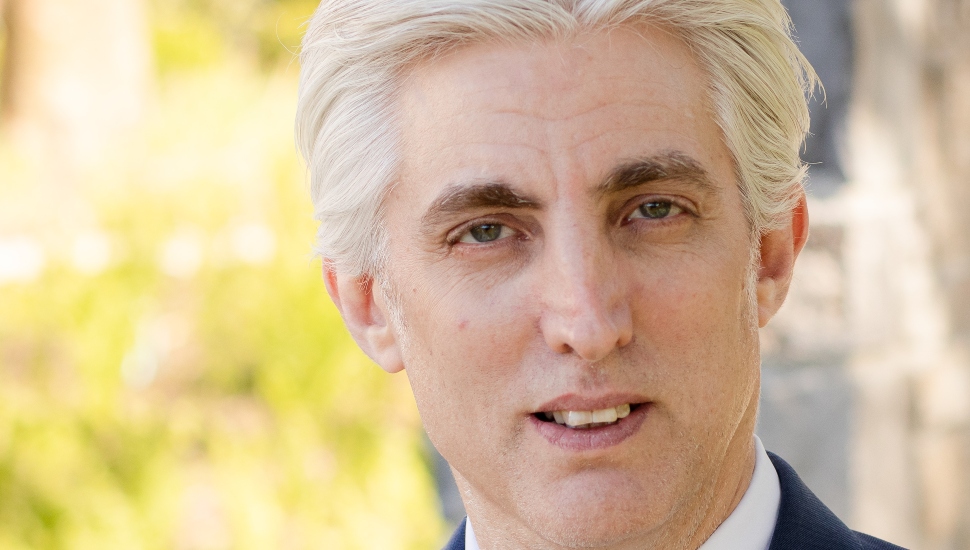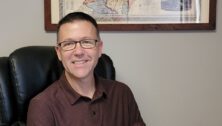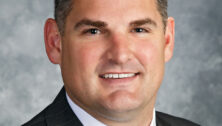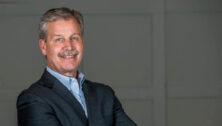Bucks County Leadership: Zak Berkman, Producing Artistic Director, People’s Light

Zak Berkman, Producing Artistic Director at People’s Light, a professional non-profit theatre company in Malvern, spoke with BUCKSCO Today about growing up in Amherst, Massachusetts. He got his first taste of the theater world from his father, a professor of playwriting and dramatic literature, and was inspired by the intellectual and creative atmosphere of Amherst.
Berkman recalled studying at Oberlin College before going to New York, where he became involved in developing and producing new plays and musicals. He shared how he ended up moving to Pennsylvania to work for People’s Light over 10 years ago and how the theater is coping with the changes of the pandemic.
Where were you born, and where did you grow up, Zak?
I was born in Turners Falls, Massachusetts, and grew up in Amherst, Massachusetts.
What did your parents do?
Both of my parents are academics. My mother recently retired from the University of Massachusetts in Amherst. She was a historian and launched one of the first women’s studies departments in the country. My father teaches playwriting and dramatic literature at Smith College — so you see where the theater gene comes from.
They both are published authors, and my father is also a professional dramaturg, meaning that he spent a lot of time working with writers on new work. I had the privilege of tagging along as a little kid and having some of the great writers and playwrights around my kitchen table. My number one is Caryl Churchill, who’s a British playwright, and my father invited her Smith to lead a masterclasses with the students.
What else do you remember from growing up in Western Massachusetts?
I had a really fortunate, privileged childhood. My public school system was rich with music and theater and arts and people who cared about thinking and talking and reading. Being in an environment where people were eager to engage in important subject matter and see it as fun to debate everything from politics to the greatest rock band — that kind of cultural background was really special.
Did you play any sports in high school, or did you stay on the drama and art side?
As a young kid I played baseball, and I played tennis a little bit more seriously going into high school. But I have scoliosis, and that started playing its tricks on me as I got older. I was involved in athletics, but I focused much more on music growing up.
What instrument do you play?
I first learned keyboards, the piano, and the trumpet, and I sang and was in the choir. Then I learned guitar so I could have a rock band in high school and seem cool. I didn’t think theater was in my future until much further along.
What about your music taste? What kind of music were you listening to in high school and college?
It was very broad. I loved the British folk music of the late ’60s and early ’70s like Richard & Linda Thompson, Fairport Convention, and Steeleye Span. I was a huge U2 lover from the day my brother brought home their first album. That storytelling music, political music, appeals to me. I was a fan of Susanne Vega and Shawn Colvin. I’m 53 years old, so my era of music was from Live Aid in the late ’80s to Lilith Fair in the mid-’90s. I loved Sarah McLachlan and The Police.
What about work? Did you have jobs while you were growing up?
I worked at the local library as a page. When I was in college, my first summer, I was part of a fledgling theater company in Vermont. And then I started working at various theaters over the summers, from New York Stage and Film at Vassar College to the Sundance Play Lab, where I learned more about the world of producing.
You were producing. You weren’t just acting in those companies.
No — no one would want to see me act. That was not my strength. Early on, maybe because of DNA, I fell in love with the development of new plays and musicals. I had been an apprentice at New York Stage and Film, and I then got hired as their New Works Coordinator.
Once I got into the professional sphere, while I continued to write and direct, I realized that producing — putting together the puzzle pieces and bringing exciting people together — was very exciting to me and ended up being the top of my focus.
When did you first realize that you had that unique ability and skill?
I did it in college without knowing what my strengths necessarily were. I did it because I was impatient and I wanted to do something different that was happening on campus.
After I moved to New York City, I worked for three years with a Commercial Producer named Margo Lion. She worked within the Jujamcyn theatre family, which is one of the three major theater owners in New York. I was her right hand during the time when her productions of Angels in America and Jelly’s Last Jam toured America, a few musicals she steered that never made it to production, as well as a musical adaptation of Mariveaux’s The Triumph of Love that had an ill-fated run on Broadway.
Let’s go back for a second. Where did you end up going to college, and why there?
I went to Oberlin College in Ohio. I had taken six years of Russian and thought I wanted to go into International Relations. I did not get into Tufts, my number one school, which has a strong International Relations program.
I was torn between the places that I had gotten into. Oberlin was the only one where I had friends who were already there. It was such a different experience, going to that campus and seeing it through the eyes of peers. Then I learned about the Sociology department, which was, at the time, one of the strongest in the liberal arts world. I was a Sociology major who accidentally became a Theater major when I realized I was only three credits shy of a double major.
Was Oberlin a good choice for you?
Yes, Oberlin’s a terrific place. It was much like Amherst, a place where people sit around and chew on subjects for long periods of time, where deep relationships occur, and where music and culture are treasured. But it’s a small, small little blue spot in a very red Ohio that is very flat, and I got claustrophobic. I ended up studying in London twice while at Oberlin so that I had that broader cosmopolitan experience.
Who saw promise in you in those early days and gave you opportunities that you didn’t necessarily deserve?
It’s interesting for me to look back because there were a lot of people who weren’t necessarily mentors, but they gave me the benefit of the doubt, and that allowed me to explore the work I was interested in doing.
I had written my first play out of college, and I knew I wanted to do a reading of it. I met Marcia Gay Harden through another reading of a play that I coordinated at New York Stage and Film. Marcia Gay, to her credit, saw me as a human and not just the person making coffee. So, she was the first person I called about my play. I was like, “Is there any world that you would do this reading?” She said, “Sure, I’ll do it.”
During the rehearsal, I remember her saying to me — because somebody asked me a question and I equivocated — and she said, “Stop it. Don’t be bashful. You know what you want. Let us know what you want.” Her response imprinted so strongly on me.
Is there anybody else who stands out like that?
I met David Strathairn when I was around 10 years old, through my father, and then when I worked on New York Stage and Film with him. When I co-founded the Epic Theatre Ensemble in New York, there was a salon that we held to talk about what we wanted to accomplish. David was there and he crystallized something that we were trying to articulate in such a helpful way that I think it led to people investing in us that we might not have gotten if he hadn’t done it. He was also the one who said, “You should meet Abigail Adams,” who was the then-Executive Artistic Director at People’s Light.
So, how did you get to People’s Light? What drew you?
I ran this company, Epic Theater Ensemble in New York, with two of my Oberlin colleagues and a few other folks for 10 years. We had established ourselves as a distinctive off-Broadway theater that did a lot of work in the public schools throughout the five boroughs. We were about building a new and more diverse generation of audiences.
We had just completed a five-year plan that involved a festival-style production of a Sarah Ruhl play called Passion Play in a converted church in Brooklyn. It did great; we were featured in The New York Times. Our school programs were doing very well. We had launched a school on our own with other school administrators in the South Bronx. We were starting to see alumni from our program going to college and finding a life in the arts. But a lot of us were entering that phase in our lives where we were having children, and our priorities were starting to evolve.
For many years, Abigail Adams and I were being told, “You should meet one another,” because we shared certain similarities in our tastes of work. Abbey had gotten a grant to put together some summer laboratories with professional artists who work with young people. She met with me to talk about whether Epic might want to be involved. And she invited me to work on a partnership with Longwood Gardens that would bring writers and designers to create site-specific work in Longwood.
After the retreat, she said, “We’re also looking at succession strategies and are looking to hire the next tier of leadership that we hope would be ready to take on the mantle when the managing director and I retire.” My wife and I visited a few times, saw a few shows, and ultimately said, “This is right for us.” That was 2011.
Here we are, more than halfway through 2024. What are your priorities and objectives for the rest of the year?
Like many regional theaters, we’re figuring out the right business model that will be sustainable for us in the pandemic era. I refuse to say “post-pandemic” because we are still within the waves of that meteor that crashed into the water for the live arts. How much of the challenges of audience return or donor fatigue are long-lasting? What changes are required to attract both past audiences and new audiences? What’s going to generate deeper investment in our organization long-term? My role is to think about how to stabilize so that we can grow.
What excites me most about People’s Light is that our location is extraordinary. Eighty-five percent of our audience comes from a 15-mile radius, so that doesn’t even touch Philly. We are people’s dominant way of having a live theater in their lives, as well as other live arts experiences. We can be a third place, a location other than home and work, that people can gather and have contact with people and experience a shared story and realize, “It’s good to be human. I don’t want to be stuck on my couch and hiding from everybody.”
I think the next stage of this is to understand that we have the opportunity to be a live arts hub that extends beyond live theater. We’re in conversations about doing a lot more concerts and music. When we were shut down, we did these drive-in concerts that were incredibly successful. We’re very good friends with Hal Real at World Cafe Live and discussed a partnership. We’re looking at that, live comedy, live podcast recordings, and other kinds of events.
Just before the pandemic, we built an extension to our event space — this gorgeous pavilion with a new bar. This year, we started this experiment called Flight Nights, which is a culinary, creative, and social experience where people get a flight of alcohol. In between each of the flights of alcohol is a short theatrical provocation that raises a key ethical question or moral question that people will want to talk about. They’ve all been sold out.
One of the reasons you came to People’s Light was that you didn’t want to work 80 hours anymore. What are you doing with all that free time?
It’s a different kind of 80 hours, but it’s still pretty much 80 hours. Most of my free time is spent with my family. My boys are 19 and 16, and they’re extraordinary.
And when I can carve out creative time, I’m trying to find moments for creative projects and not succumb to all the negativity of the world. For example, I adapted a version of A Christmas Carol that we produced last year that involves music that I composed, as well as an adaptation.
Zak, I have three last questions for you. What’s something big that you’ve changed your mind about over the last 10 years?
I think I had a notion: When you grow up in Amherst, Mass., there is a tendency of being born with a savior complex, that you know what’s right in the world, and that you are going to change everyone’s minds and make everything better. It was interesting going from making theater in New York City, which carries some of that perspective, to working in a setting like Malvern, where you realize that simply creating a connection between people is transformative. It’s a critical starting point and antidote to all the forces of distrust and isolation in our society.
It impacts how I think about what we’re going to program. I might have, 10 years ago, been like, “That’s a little mainstream,” as opposed to going, “I can think of all the different people who are going to feel embraced and seen by having that moment together, and that’s enough.”
I don’t need to know whether or not it’s going to change their political point of view or whether it’s going to make them think about something differently; I just need to know that they are going to have some faith and trust that human beings can make something beautiful.
That prompts my next question. It’s a crazy world out there. What keeps you hopeful and optimistic?
What personally gets me up in the morning is knowing that I’ve got a 16-year-old and a 19-year-old in this world, and I don’t want to fuck it up any more than I already have. But from a sense of optimism, when I listen to music and I realize how much energy it gives me to hear someone express something in some artistic way that is galvanizing, I try to translate that to everything that we’re doing here.
Finally, Zak, what’s the best advice you’ve ever received?
My father, Len Berkman, as I mentioned, is a dramaturg. Something he said to me early on in my writing was, “The thing about theater is there’s no way for us to know what a person is thinking if they don’t say it.”
In film and television, you can read it in their eyes. That was both useful to me as a writer and also useful for when I look at why something is not quite working in a play we’re working on.
You could also extrapolate that as a life lesson, which is if you don’t say it — if you don’t communicate it to your partner or your child or your colleague — you cannot assume they know what you’re thinking. I see it as both an artistic practice benefit and a life benefit.
Connect With Your Community
Subscribe for stories that matter!
"*" indicates required fields






























